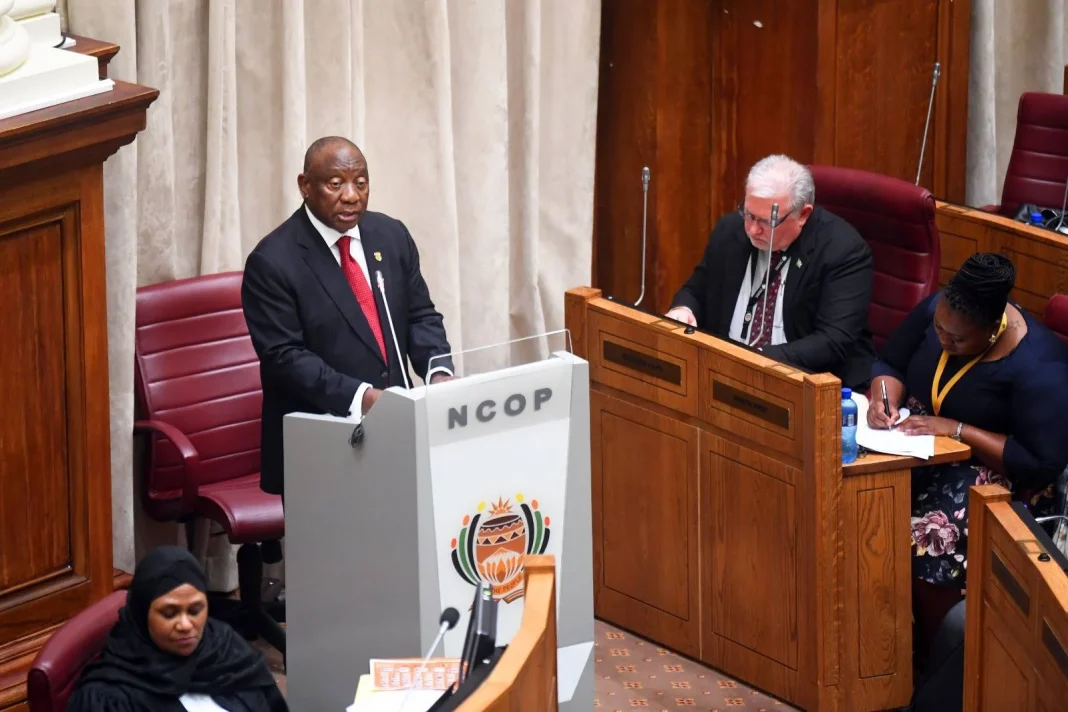By Simon Nare
President Cyril Ramaphosa said on Wednesday that there was no need for a Commission of Inquiry to address concerns raised by the Auditor-General or for a review of municipal boundaries.
Ramaphosa was addressing oral questions in the National Council of Provinces (NCOP) in Cape Town on Wednesday.
He said the 2024/2025 Auditor-General’s Local Government Audit Report, released in May 2025, highlighted the persistent deterioration in financial management, governance and service delivery performance in many municipalities across the country.
“The report paints a stark picture of widespread financial mismanagement, non-compliance, irregular expenditure, lack of consequence management and weak internal controls in a significant number of municipalities,” said Ramaphosa.
“While some of these challenges are specific to each municipality, many have their roots in systemic problems and must be addressed through structural reform.”
He told MPs that the Department of Cooperative Governance has embarked on a process to update the White Paper on Local Government to ensure that the local government system is effective and fit-for-purpose.
“We are taking steps to address the challenges municipalities are facing. Many of these issues are systemic and require structural reforms,” said Ramaphosa.
“COGTA has begun updating the white paper to ensure the local government system is effective and delivers good service to the people. The minister is engaged in a series of engagements with social partners. This week, he held a review of the white paper.”
He said while the issue of optimising the number of municipalities, as well as the appropriateness of the two-tier system of local government, must be considered as part of this process.
Ramaphosa added that while there are strong arguments for having fewer municipalities, there are also strong reasons to ensure that local government remains local and accountable to the people that it serves.
“These decisions must therefore be based on a careful assessment of the evidence, and must aim to ensure that municipalities are financially sustainable, to remove any duplication of fuctions, and to improve service delivery, particularly in areas where municipalities lack a sufficient revenue base,” said Ramaphosa.
“It must also be noted that the determination and the re-determination of municipal boundaries is done by the Municipal Demarcation Board, which is an independent constitutional institution.”
“There is therefore no need for the appointment of a commission of inquiry to attend to the matters raised by the Auditor-General, nor the review of municipal boundaries.”
Ramaphosa said it could not be that provinces and municipalities were underspending was impacting the local governments abilities to deliver quality and essential service to communities.
“The issue of underspending, particularly on infrastructure allocations such as housing, education, water and roads is of great concern. Inadequate or slow capital expenditure by municipalities and provinces has hampered the delivery of basic services and infrastructure,” he said.
“This results in problems like delays in housing delivery and stalled school, water, sanitation and waste management infrastructure projects. It also erodes public trusts in the state’s ability to improve the lives of citizens and exacerbates service delivery protests,” said the president.
He said the inability of municipalities to spend their budgets was often because of poor planning, weak implementation capacity and inadequate financial and supply chain management.
Ramaphosa said the national government continued to engage provinces and municipalities that were underspending persistently in order to address the root causes.
Some of the key interventions in these provinces and municipalities included budget monitoring forums coordinated by the treasury to track in-year spending and detect low expenditure patterns early, he said.
“Through Section 154 support interventions, the Department of Cooperative Governance works closely with municipalities to strengthen institutional and financial capacity. Capacity-building programmes are organised through the Municipal Infrastructure Support Agent to address skills shortages, especially in planning, engineering and project management,” he said.
The president said it could not be that people who were employed to deliver services to the people were afraid to do their jobs.
Ramaphosa said officials that were involved in wrongdoing such as corrupt activities such as stealing money and mismanagement should be held to account and action being taken such officials.
“That in itself should constitute an affront to our people. And when it comes to where we do not spend money which has been allocated, I have characterized as treasonous against our people because our people as the elect us they expect us to do the work that we been elected and mandated to do,” said Ramaphosa.
“And when without any cause or good reason we do not spend the money that has been allocated that militates directly against their interests and it should be seen as something like a crime against our people. So, we need to have that in mind, and it needs to be something that we fear to do, we fear to be involved because we are acting on behalf of our people.”
INSIDE METROS

